Critical Analysis: Essential Competencies for MNC HR Directors
VerifiedAdded on 2023/06/15
|6
|1433
|407
Essay
AI Summary
This essay discusses the essential competencies expected of Human Resource Directors in multinational organizations, highlighting the increasing demand for diverse skills in managing global workforces. It emphasizes the importance of adjusting to the latest communication mediums, effectively working in diverse cultural environments, employing geocentric recruitment and selection strategies, and demonstrating flexibility in cross-cultural management. The essay critically analyzes these competencies based on various authors' perspectives, underscoring their significance in enabling HR directors to manage human resources effectively in a global scenario. Desklib offers a wealth of similar resources for students.
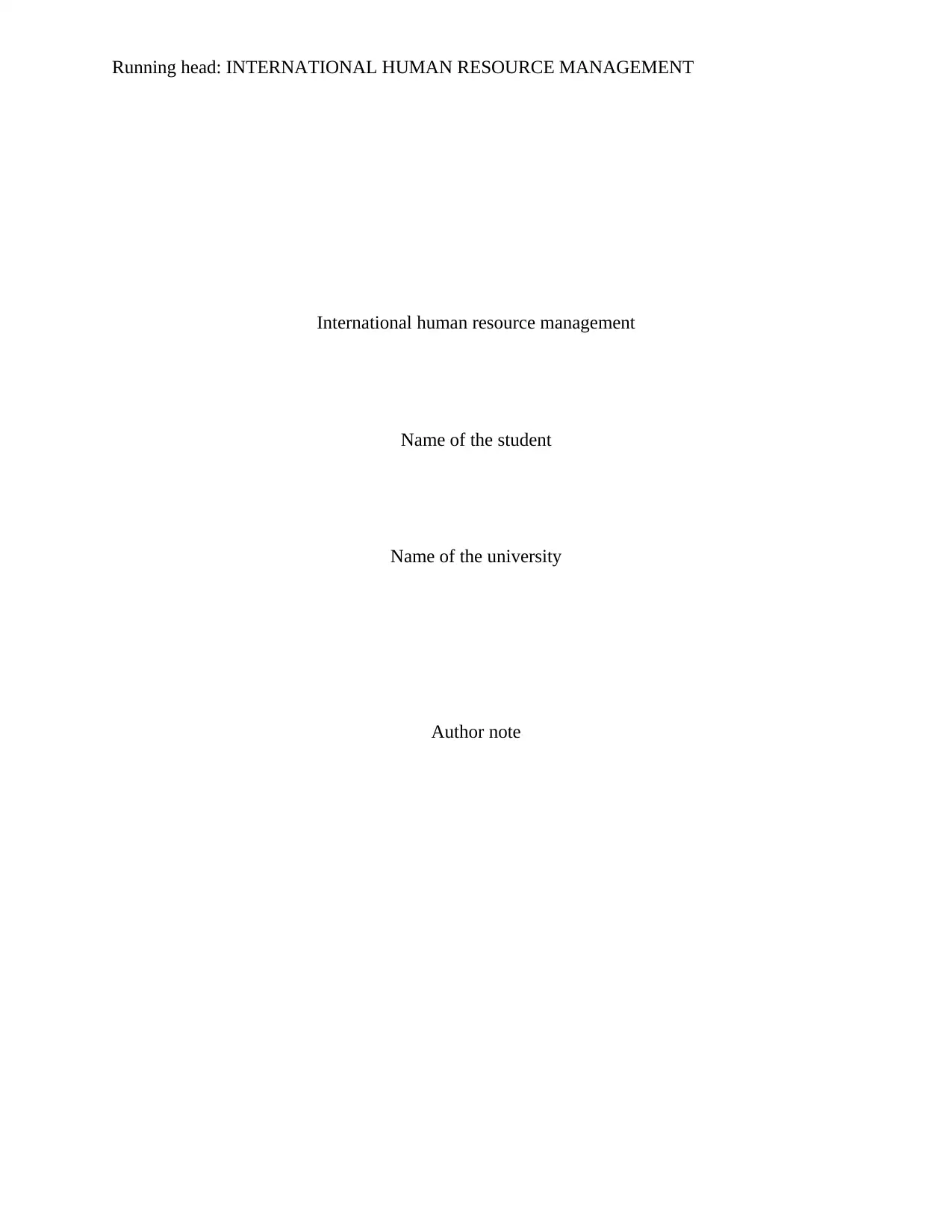
Running head: INTERNATIONAL HUMAN RESOURCE MANAGEMENT
International human resource management
Name of the student
Name of the university
Author note
International human resource management
Name of the student
Name of the university
Author note
Paraphrase This Document
Need a fresh take? Get an instant paraphrase of this document with our AI Paraphraser
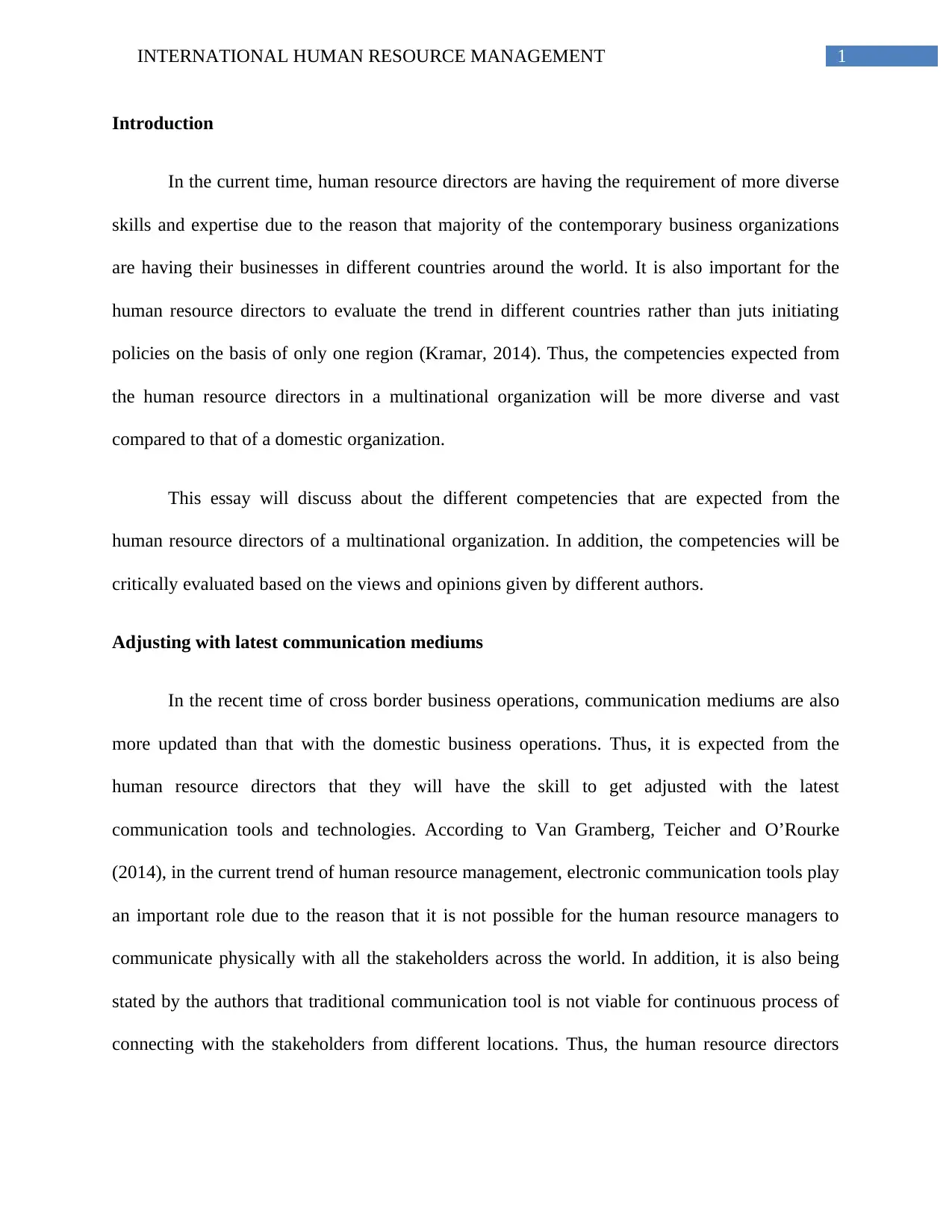
1INTERNATIONAL HUMAN RESOURCE MANAGEMENT
Introduction
In the current time, human resource directors are having the requirement of more diverse
skills and expertise due to the reason that majority of the contemporary business organizations
are having their businesses in different countries around the world. It is also important for the
human resource directors to evaluate the trend in different countries rather than juts initiating
policies on the basis of only one region (Kramar, 2014). Thus, the competencies expected from
the human resource directors in a multinational organization will be more diverse and vast
compared to that of a domestic organization.
This essay will discuss about the different competencies that are expected from the
human resource directors of a multinational organization. In addition, the competencies will be
critically evaluated based on the views and opinions given by different authors.
Adjusting with latest communication mediums
In the recent time of cross border business operations, communication mediums are also
more updated than that with the domestic business operations. Thus, it is expected from the
human resource directors that they will have the skill to get adjusted with the latest
communication tools and technologies. According to Van Gramberg, Teicher and O’Rourke
(2014), in the current trend of human resource management, electronic communication tools play
an important role due to the reason that it is not possible for the human resource managers to
communicate physically with all the stakeholders across the world. In addition, it is also being
stated by the authors that traditional communication tool is not viable for continuous process of
connecting with the stakeholders from different locations. Thus, the human resource directors
Introduction
In the current time, human resource directors are having the requirement of more diverse
skills and expertise due to the reason that majority of the contemporary business organizations
are having their businesses in different countries around the world. It is also important for the
human resource directors to evaluate the trend in different countries rather than juts initiating
policies on the basis of only one region (Kramar, 2014). Thus, the competencies expected from
the human resource directors in a multinational organization will be more diverse and vast
compared to that of a domestic organization.
This essay will discuss about the different competencies that are expected from the
human resource directors of a multinational organization. In addition, the competencies will be
critically evaluated based on the views and opinions given by different authors.
Adjusting with latest communication mediums
In the recent time of cross border business operations, communication mediums are also
more updated than that with the domestic business operations. Thus, it is expected from the
human resource directors that they will have the skill to get adjusted with the latest
communication tools and technologies. According to Van Gramberg, Teicher and O’Rourke
(2014), in the current trend of human resource management, electronic communication tools play
an important role due to the reason that it is not possible for the human resource managers to
communicate physically with all the stakeholders across the world. In addition, it is also being
stated by the authors that traditional communication tool is not viable for continuous process of
connecting with the stakeholders from different locations. Thus, the human resource directors
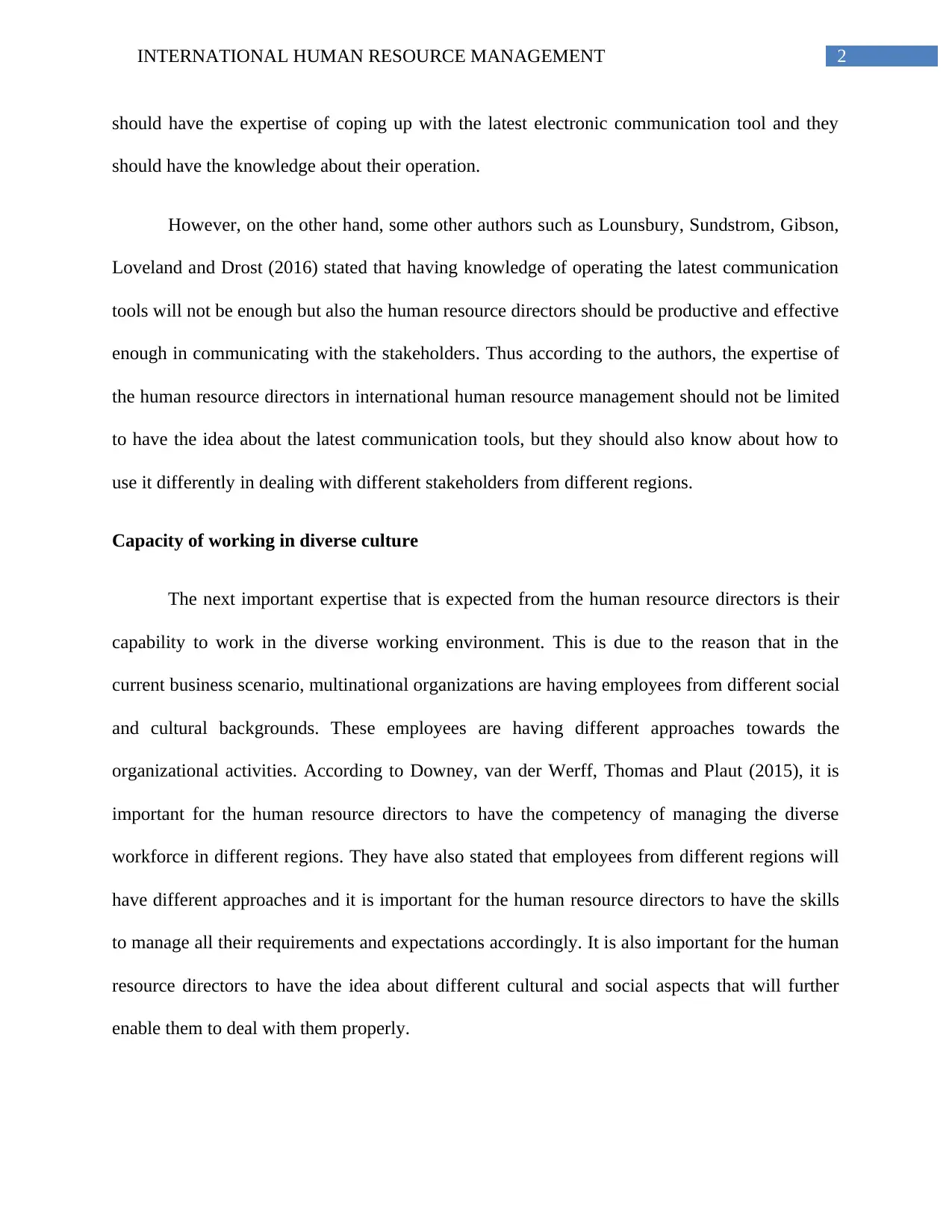
2INTERNATIONAL HUMAN RESOURCE MANAGEMENT
should have the expertise of coping up with the latest electronic communication tool and they
should have the knowledge about their operation.
However, on the other hand, some other authors such as Lounsbury, Sundstrom, Gibson,
Loveland and Drost (2016) stated that having knowledge of operating the latest communication
tools will not be enough but also the human resource directors should be productive and effective
enough in communicating with the stakeholders. Thus according to the authors, the expertise of
the human resource directors in international human resource management should not be limited
to have the idea about the latest communication tools, but they should also know about how to
use it differently in dealing with different stakeholders from different regions.
Capacity of working in diverse culture
The next important expertise that is expected from the human resource directors is their
capability to work in the diverse working environment. This is due to the reason that in the
current business scenario, multinational organizations are having employees from different social
and cultural backgrounds. These employees are having different approaches towards the
organizational activities. According to Downey, van der Werff, Thomas and Plaut (2015), it is
important for the human resource directors to have the competency of managing the diverse
workforce in different regions. They have also stated that employees from different regions will
have different approaches and it is important for the human resource directors to have the skills
to manage all their requirements and expectations accordingly. It is also important for the human
resource directors to have the idea about different cultural and social aspects that will further
enable them to deal with them properly.
should have the expertise of coping up with the latest electronic communication tool and they
should have the knowledge about their operation.
However, on the other hand, some other authors such as Lounsbury, Sundstrom, Gibson,
Loveland and Drost (2016) stated that having knowledge of operating the latest communication
tools will not be enough but also the human resource directors should be productive and effective
enough in communicating with the stakeholders. Thus according to the authors, the expertise of
the human resource directors in international human resource management should not be limited
to have the idea about the latest communication tools, but they should also know about how to
use it differently in dealing with different stakeholders from different regions.
Capacity of working in diverse culture
The next important expertise that is expected from the human resource directors is their
capability to work in the diverse working environment. This is due to the reason that in the
current business scenario, multinational organizations are having employees from different social
and cultural backgrounds. These employees are having different approaches towards the
organizational activities. According to Downey, van der Werff, Thomas and Plaut (2015), it is
important for the human resource directors to have the competency of managing the diverse
workforce in different regions. They have also stated that employees from different regions will
have different approaches and it is important for the human resource directors to have the skills
to manage all their requirements and expectations accordingly. It is also important for the human
resource directors to have the idea about different cultural and social aspects that will further
enable them to deal with them properly.
⊘ This is a preview!⊘
Do you want full access?
Subscribe today to unlock all pages.

Trusted by 1+ million students worldwide
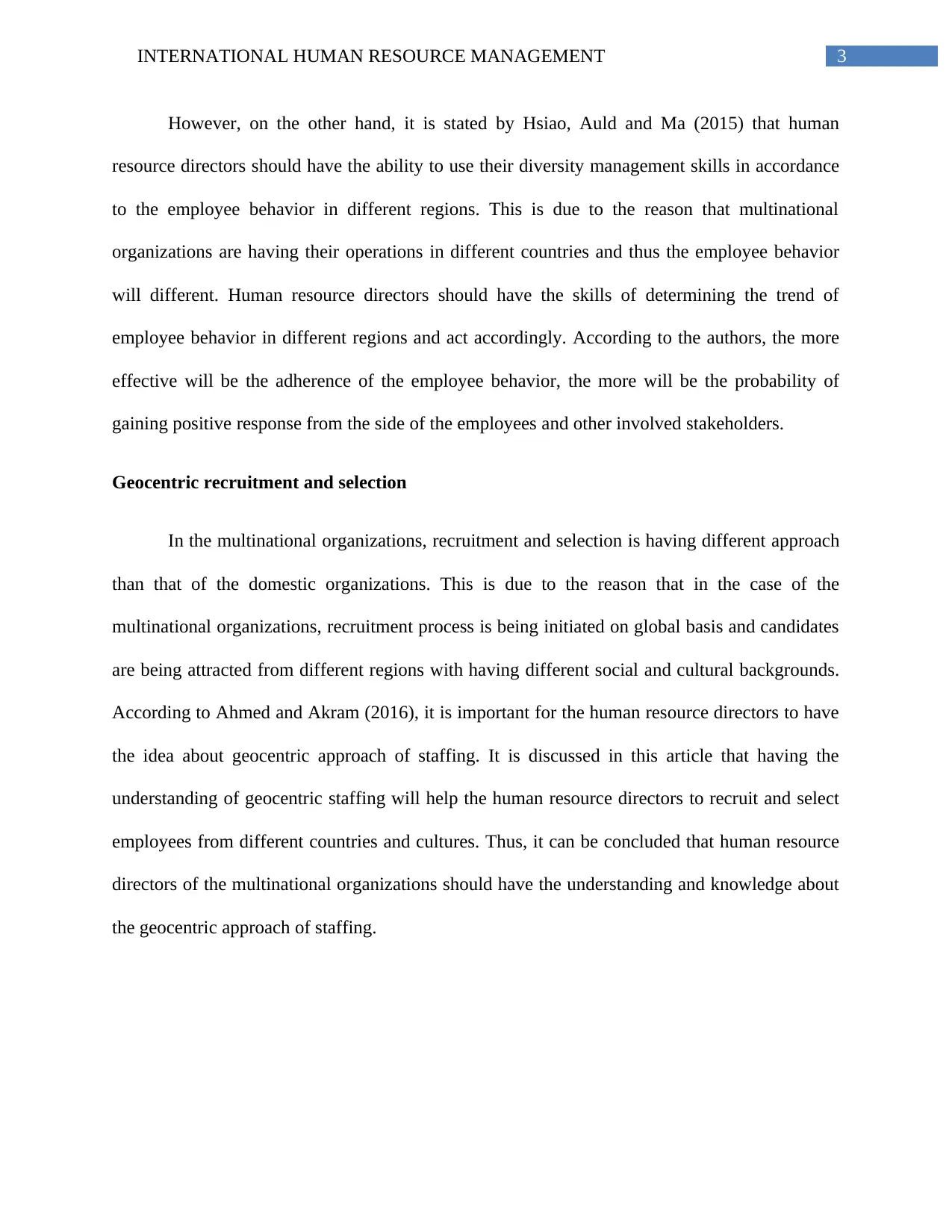
3INTERNATIONAL HUMAN RESOURCE MANAGEMENT
However, on the other hand, it is stated by Hsiao, Auld and Ma (2015) that human
resource directors should have the ability to use their diversity management skills in accordance
to the employee behavior in different regions. This is due to the reason that multinational
organizations are having their operations in different countries and thus the employee behavior
will different. Human resource directors should have the skills of determining the trend of
employee behavior in different regions and act accordingly. According to the authors, the more
effective will be the adherence of the employee behavior, the more will be the probability of
gaining positive response from the side of the employees and other involved stakeholders.
Geocentric recruitment and selection
In the multinational organizations, recruitment and selection is having different approach
than that of the domestic organizations. This is due to the reason that in the case of the
multinational organizations, recruitment process is being initiated on global basis and candidates
are being attracted from different regions with having different social and cultural backgrounds.
According to Ahmed and Akram (2016), it is important for the human resource directors to have
the idea about geocentric approach of staffing. It is discussed in this article that having the
understanding of geocentric staffing will help the human resource directors to recruit and select
employees from different countries and cultures. Thus, it can be concluded that human resource
directors of the multinational organizations should have the understanding and knowledge about
the geocentric approach of staffing.
However, on the other hand, it is stated by Hsiao, Auld and Ma (2015) that human
resource directors should have the ability to use their diversity management skills in accordance
to the employee behavior in different regions. This is due to the reason that multinational
organizations are having their operations in different countries and thus the employee behavior
will different. Human resource directors should have the skills of determining the trend of
employee behavior in different regions and act accordingly. According to the authors, the more
effective will be the adherence of the employee behavior, the more will be the probability of
gaining positive response from the side of the employees and other involved stakeholders.
Geocentric recruitment and selection
In the multinational organizations, recruitment and selection is having different approach
than that of the domestic organizations. This is due to the reason that in the case of the
multinational organizations, recruitment process is being initiated on global basis and candidates
are being attracted from different regions with having different social and cultural backgrounds.
According to Ahmed and Akram (2016), it is important for the human resource directors to have
the idea about geocentric approach of staffing. It is discussed in this article that having the
understanding of geocentric staffing will help the human resource directors to recruit and select
employees from different countries and cultures. Thus, it can be concluded that human resource
directors of the multinational organizations should have the understanding and knowledge about
the geocentric approach of staffing.
Paraphrase This Document
Need a fresh take? Get an instant paraphrase of this document with our AI Paraphraser
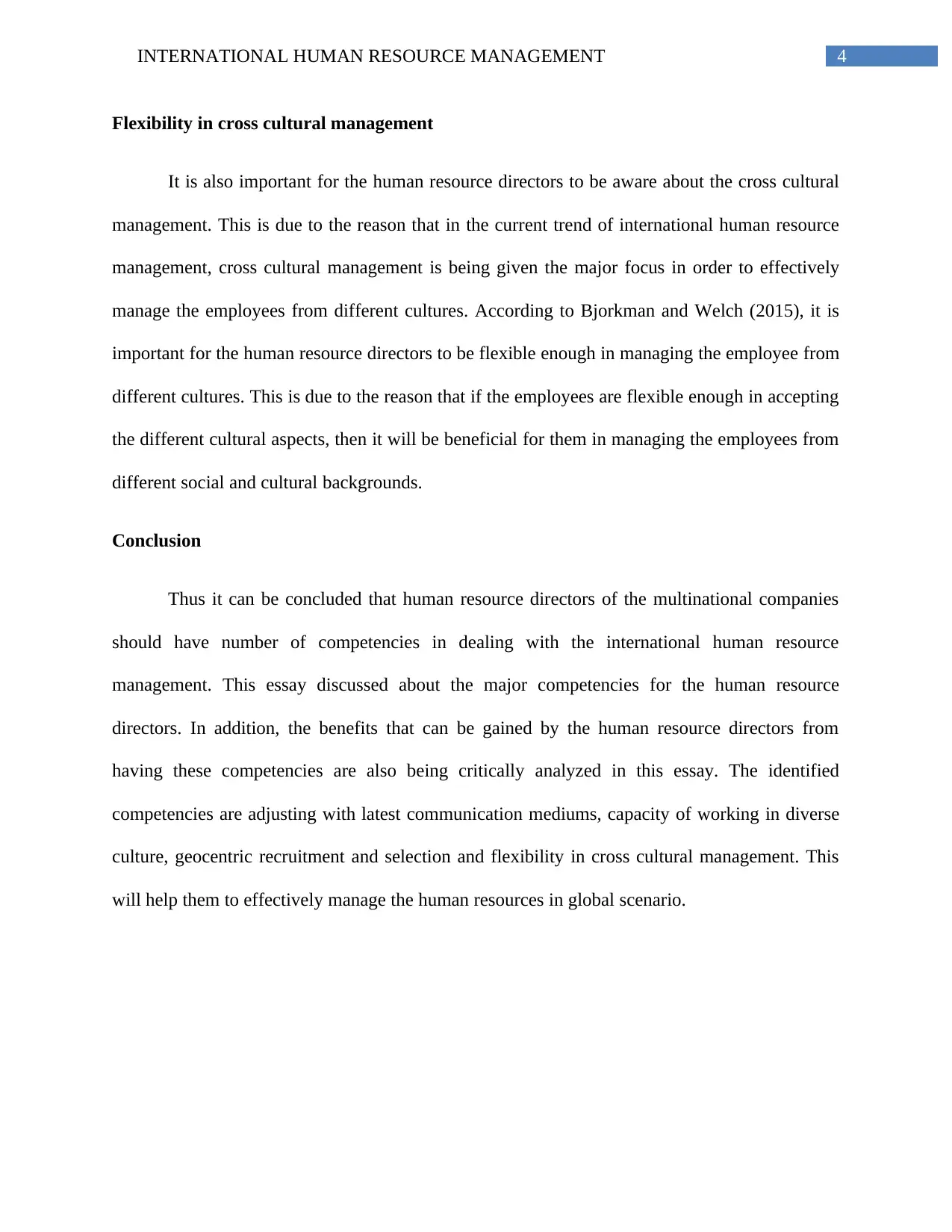
4INTERNATIONAL HUMAN RESOURCE MANAGEMENT
Flexibility in cross cultural management
It is also important for the human resource directors to be aware about the cross cultural
management. This is due to the reason that in the current trend of international human resource
management, cross cultural management is being given the major focus in order to effectively
manage the employees from different cultures. According to Bjorkman and Welch (2015), it is
important for the human resource directors to be flexible enough in managing the employee from
different cultures. This is due to the reason that if the employees are flexible enough in accepting
the different cultural aspects, then it will be beneficial for them in managing the employees from
different social and cultural backgrounds.
Conclusion
Thus it can be concluded that human resource directors of the multinational companies
should have number of competencies in dealing with the international human resource
management. This essay discussed about the major competencies for the human resource
directors. In addition, the benefits that can be gained by the human resource directors from
having these competencies are also being critically analyzed in this essay. The identified
competencies are adjusting with latest communication mediums, capacity of working in diverse
culture, geocentric recruitment and selection and flexibility in cross cultural management. This
will help them to effectively manage the human resources in global scenario.
Flexibility in cross cultural management
It is also important for the human resource directors to be aware about the cross cultural
management. This is due to the reason that in the current trend of international human resource
management, cross cultural management is being given the major focus in order to effectively
manage the employees from different cultures. According to Bjorkman and Welch (2015), it is
important for the human resource directors to be flexible enough in managing the employee from
different cultures. This is due to the reason that if the employees are flexible enough in accepting
the different cultural aspects, then it will be beneficial for them in managing the employees from
different social and cultural backgrounds.
Conclusion
Thus it can be concluded that human resource directors of the multinational companies
should have number of competencies in dealing with the international human resource
management. This essay discussed about the major competencies for the human resource
directors. In addition, the benefits that can be gained by the human resource directors from
having these competencies are also being critically analyzed in this essay. The identified
competencies are adjusting with latest communication mediums, capacity of working in diverse
culture, geocentric recruitment and selection and flexibility in cross cultural management. This
will help them to effectively manage the human resources in global scenario.
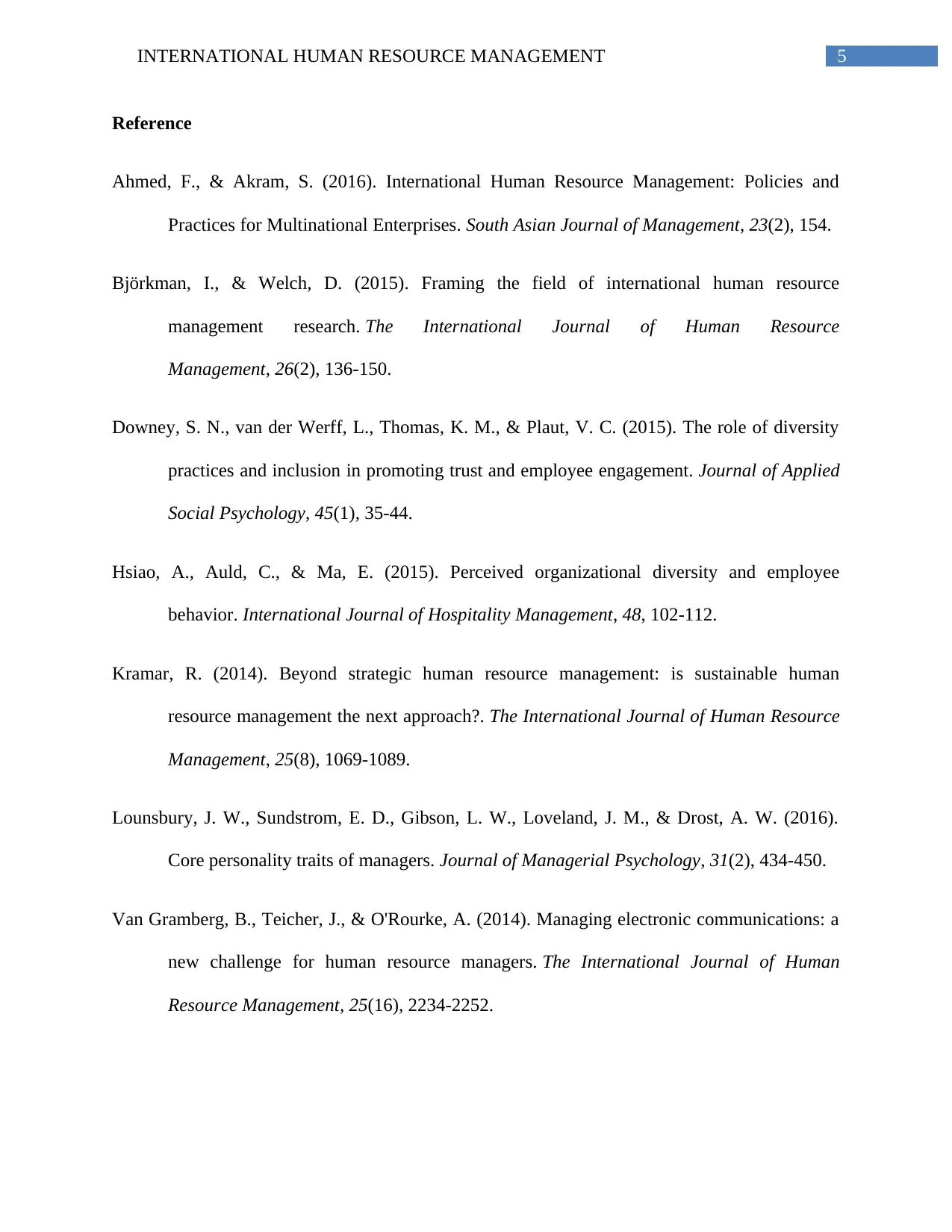
5INTERNATIONAL HUMAN RESOURCE MANAGEMENT
Reference
Ahmed, F., & Akram, S. (2016). International Human Resource Management: Policies and
Practices for Multinational Enterprises. South Asian Journal of Management, 23(2), 154.
Björkman, I., & Welch, D. (2015). Framing the field of international human resource
management research. The International Journal of Human Resource
Management, 26(2), 136-150.
Downey, S. N., van der Werff, L., Thomas, K. M., & Plaut, V. C. (2015). The role of diversity
practices and inclusion in promoting trust and employee engagement. Journal of Applied
Social Psychology, 45(1), 35-44.
Hsiao, A., Auld, C., & Ma, E. (2015). Perceived organizational diversity and employee
behavior. International Journal of Hospitality Management, 48, 102-112.
Kramar, R. (2014). Beyond strategic human resource management: is sustainable human
resource management the next approach?. The International Journal of Human Resource
Management, 25(8), 1069-1089.
Lounsbury, J. W., Sundstrom, E. D., Gibson, L. W., Loveland, J. M., & Drost, A. W. (2016).
Core personality traits of managers. Journal of Managerial Psychology, 31(2), 434-450.
Van Gramberg, B., Teicher, J., & O'Rourke, A. (2014). Managing electronic communications: a
new challenge for human resource managers. The International Journal of Human
Resource Management, 25(16), 2234-2252.
Reference
Ahmed, F., & Akram, S. (2016). International Human Resource Management: Policies and
Practices for Multinational Enterprises. South Asian Journal of Management, 23(2), 154.
Björkman, I., & Welch, D. (2015). Framing the field of international human resource
management research. The International Journal of Human Resource
Management, 26(2), 136-150.
Downey, S. N., van der Werff, L., Thomas, K. M., & Plaut, V. C. (2015). The role of diversity
practices and inclusion in promoting trust and employee engagement. Journal of Applied
Social Psychology, 45(1), 35-44.
Hsiao, A., Auld, C., & Ma, E. (2015). Perceived organizational diversity and employee
behavior. International Journal of Hospitality Management, 48, 102-112.
Kramar, R. (2014). Beyond strategic human resource management: is sustainable human
resource management the next approach?. The International Journal of Human Resource
Management, 25(8), 1069-1089.
Lounsbury, J. W., Sundstrom, E. D., Gibson, L. W., Loveland, J. M., & Drost, A. W. (2016).
Core personality traits of managers. Journal of Managerial Psychology, 31(2), 434-450.
Van Gramberg, B., Teicher, J., & O'Rourke, A. (2014). Managing electronic communications: a
new challenge for human resource managers. The International Journal of Human
Resource Management, 25(16), 2234-2252.
⊘ This is a preview!⊘
Do you want full access?
Subscribe today to unlock all pages.

Trusted by 1+ million students worldwide
1 out of 6
Related Documents
Your All-in-One AI-Powered Toolkit for Academic Success.
+13062052269
info@desklib.com
Available 24*7 on WhatsApp / Email
![[object Object]](/_next/static/media/star-bottom.7253800d.svg)
Unlock your academic potential
Copyright © 2020–2026 A2Z Services. All Rights Reserved. Developed and managed by ZUCOL.





